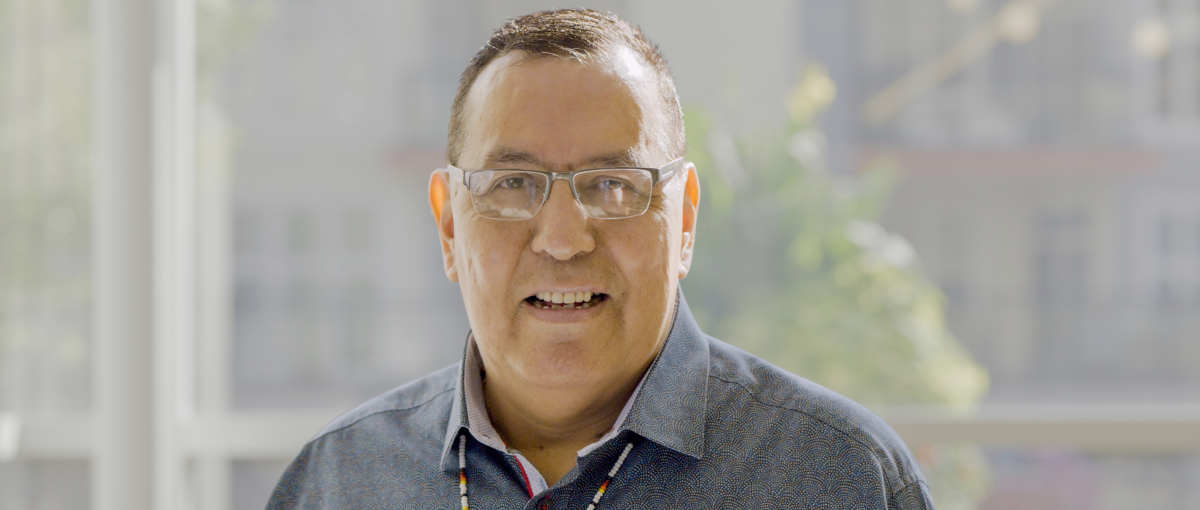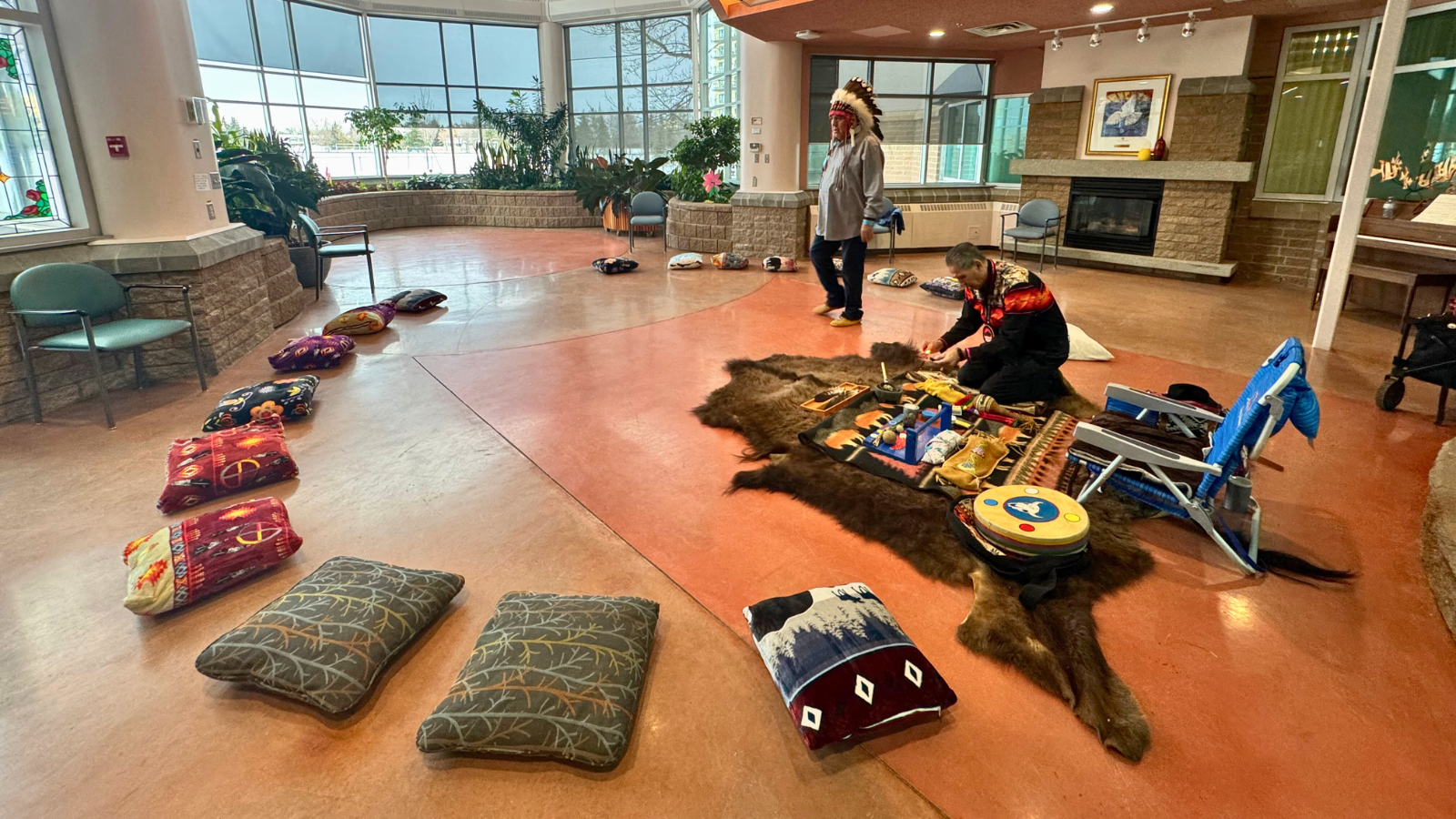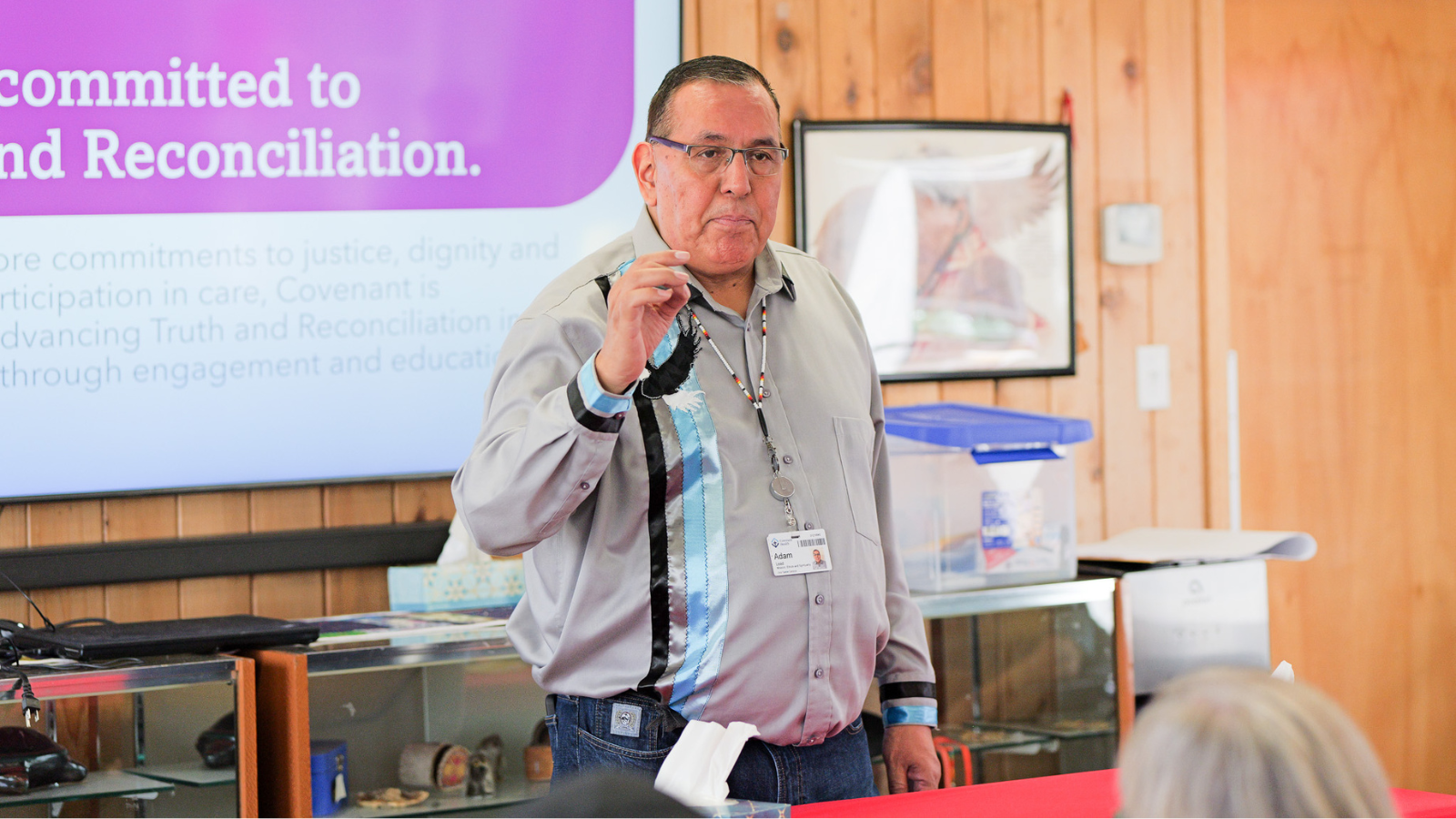Meet Adam North Peigan, lead, Indigenous health development and community engagement

September 25, 2025
By Peter Rybar, social media advisor
When Adam North Peigan returned to his community at age 18, he thought he was finally coming home. Instead, he found himself parachuted into what felt like a war zone filled with poverty, substance abuse and housing conditions unlike anything he'd experienced in the White foster homes where he'd spent his entire childhood.
“I experienced culture shock like you cannot imagine because I had adapted to living in White homes my whole life," Adam says. “Coming home should have been filled with excitement and enthusiasm, but for me it wasn't. I was very scared throughout the whole process."
Today, that same man who once felt like a stranger in his own community now leads Covenant's focused work in Indigenous wellness and reconciliation. As the organization's first-ever lead for Indigenous health development and community engagement, Adam brings his lived experience as a Sixties Scoop Survivor to help transform health care for Indigenous Peoples across Alberta.
Adam's journey to Covenant began three years ago when he worked briefly as an Indigenous care liaison at the Grey Nuns Community Hospital in Edmonton. Even during that short stint, he saw the potential for something bigger.
"During that time, there was really not much going on within Covenant to address Indigenous health on a large scale," Adam says. "I saw the potential for Covenant to one day develop capacity for Indigenous health and meaningful partnerships with Indigenous communities across Alberta."
When he left that role, Adam told senior leaders, "When you're ready to go down that road, give me a call."
The call came in late 2023. The organization was ready to make Indigenous wellness a strategic priority, and it needed someone who could build the program from the ground up. Adam was the natural choice.
"This is a new project for Covenant," he says. "My role is to develop partnerships with Indigenous peoples in the province of Alberta — First Nations, Métis and Inuit — and really foster and nurture those relationships."
The project launched with a Pipe Ceremony attended by Covenant's entire board and executive leadership team at St. Joseph’s Auxiliary Hospital, which was a powerful symbol of the organization's commitment to doing this work right, says Adam.
“This whole project has been grounded in Ceremony, and that's really important to me.”

Adam and Elder Dr. Whiskeyjack prepare for the Pipe Ceremony held at St. Joseph’s Auxiliary Hospital in Edmonton.
Since December 2024, Adam has been traveling across Alberta conducting engagement sessions in Edmonton, Lethbridge, Calgary, Rocky Mountain House and beyond, listening to Indigenous communities about their healthcare experiences and needs.
"We've had probably about seven or eight engagement sessions so far, and we're going to continue that journey," he says. The goal is to compile what the facilitators hear into an Indigenous health plan that will guide Covenant's approach to improving service delivery.

Adam speaks at a Indigenous health engagement session.
One of the biggest challenges Adam faces is Covenant Health's identity as a faith-based organization, given the Catholic Church's role in residential schools.
"Because Covenant is a faith-based organization, we know the history of residential schools and the colonization of our people," Adam says. "A lot of our residential school Survivors were victims of spiritual, mental, physical and sexual abuse at the hands of the Roman Catholic Church."
Rather than avoiding this reality, Adam has insisted on addressing it head-on. In response, in June 2025, Covenant's board unanimously endorsed a Statement of Commitment to Reconciliation. "It acknowledges the harms of the past, makes amends and maps out what needs to happen moving forward," Adam says.
Adam's personal journey, from a child removed from his community to a leader working to heal those very wounds, brings unique credibility to his work.
"My lived experience enhances the position because what I bring to the table is a lot of compassion for the need to address reconciliation," he says. "It allows me to empathize with participants who come out to our engagement sessions."
When Adam sees Indigenous people struggling with addiction or homelessness, he doesn't see failure. He sees the ongoing impacts of colonial policies.
"When I see our people, my first thought is maybe that person is a residential school Survivor, maybe a Sixties Scoop Survivor, maybe they've been intergenerationally impacted," he says. "That's why they are the way they are. We're not bad people; we're people who have suffered oppression."
As Sept. 30 approaches, Adam has a clear message for Covenant staff and all Canadians: wear an orange shirt, attend community gatherings and commit to learning.
"It's my hope that everybody within Covenant will don an orange shirt to acknowledge the harms of residential school, especially those who didn't make it home," he says.
Adam’s advice for meaningful reconciliation is simple but profound: "Be willing to listen to those stories as hard as they are and then do something about it. It could be something very simple, like going home that night and sharing what you heard with three or four people."
Adam has an ambitious but clear goal. He aims to address the Truth and Reconciliation Commission of Canada's Calls to Action No. 18 through 24, which focus specifically on Indigenous health.
"At the end of the day, my goal is really to do what we can in our corner of the world to improve the lives of our people when it comes to Indigenous health," he says. "It's all about improving access to quality health care."
The work isn't easy, and Adam knows it will take time. But he's optimistic about Covenant's commitment and the support he's received across the organization.
"I'm truly grateful that Covenant has been willing to go down this road," he says. "So far, it's going very well. Everyone seems to be excited and jumping on board that, yes, it’s really happening within Covenant."
To learn more about Adam’s life experiences, watch the video below from Historica Canada.